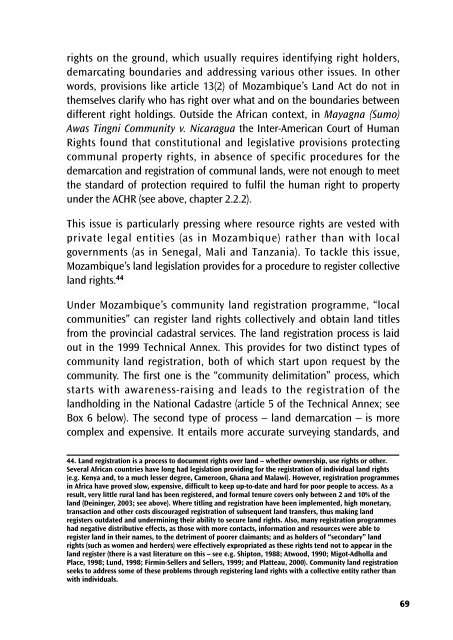Legal empowerment for local resource control
Legal empowerment for local resource control
Legal empowerment for local resource control
You also want an ePaper? Increase the reach of your titles
YUMPU automatically turns print PDFs into web optimized ePapers that Google loves.
ights on the ground, which usually requires identifying right holders,<br />
demarcating boundaries and addressing various other issues. In other<br />
words, provisions like article 13(2) of Mozambique’s Land Act do not in<br />
themselves clarify who has right over what and on the boundaries between<br />
different right holdings. Outside the African context, in Mayagna (Sumo)<br />
Awas Tingni Community v. Nicaragua the Inter-American Court of Human<br />
Rights found that constitutional and legislative provisions protecting<br />
communal property rights, in absence of specific procedures <strong>for</strong> the<br />
demarcation and registration of communal lands, were not enough to meet<br />
the standard of protection required to fulfil the human right to property<br />
under the ACHR (see above, chapter 2.2.2).<br />
This issue is particularly pressing where <strong>resource</strong> rights are vested with<br />
private legal entities (as in Mozambique) rather than with <strong>local</strong><br />
governments (as in Senegal, Mali and Tanzania). To tackle this issue,<br />
Mozambique’s land legislation provides <strong>for</strong> a procedure to register collective<br />
land rights. 44<br />
Under Mozambique’s community land registration programme, “<strong>local</strong><br />
communities” can register land rights collectively and obtain land titles<br />
from the provincial cadastral services. The land registration process is laid<br />
out in the 1999 Technical Annex. This provides <strong>for</strong> two distinct types of<br />
community land registration, both of which start upon request by the<br />
community. The first one is the “community delimitation” process, which<br />
starts with awareness-raising and leads to the registration of the<br />
landholding in the National Cadastre (article 5 of the Technical Annex; see<br />
Box 6 below). The second type of process – land demarcation – is more<br />
complex and expensive. It entails more accurate surveying standards, and<br />
44. Land registration is a process to document rights over land – whether ownership, use rights or other.<br />
Several African countries have long had legislation providing <strong>for</strong> the registration of individual land rights<br />
(e.g. Kenya and, to a much lesser degree, Cameroon, Ghana and Malawi). However, registration programmes<br />
in Africa have proved slow, expensive, difficult to keep up-to-date and hard <strong>for</strong> poor people to access. As a<br />
result, very little rural land has been registered, and <strong>for</strong>mal tenure covers only between 2 and 10% of the<br />
land (Deininger, 2003; see above). Where titling and registration have been implemented, high monetary,<br />
transaction and other costs discouraged registration of subsequent land transfers, thus making land<br />
registers outdated and undermining their ability to secure land rights. Also, many registration programmes<br />
had negative distributive effects, as those with more contacts, in<strong>for</strong>mation and <strong>resource</strong>s were able to<br />
register land in their names, to the detriment of poorer claimants; and as holders of “secondary” land<br />
rights (such as women and herders) were effectively expropriated as these rights tend not to appear in the<br />
land register (there is a vast literature on this – see e.g. Shipton, 1988; Atwood, 1990; Migot-Adholla and<br />
Place, 1998; Lund, 1998; Firmin-Sellers and Sellers, 1999; and Platteau, 2000). Community land registration<br />
seeks to address some of these problems through registering land rights with a collective entity rather than<br />
with individuals.<br />
69

















